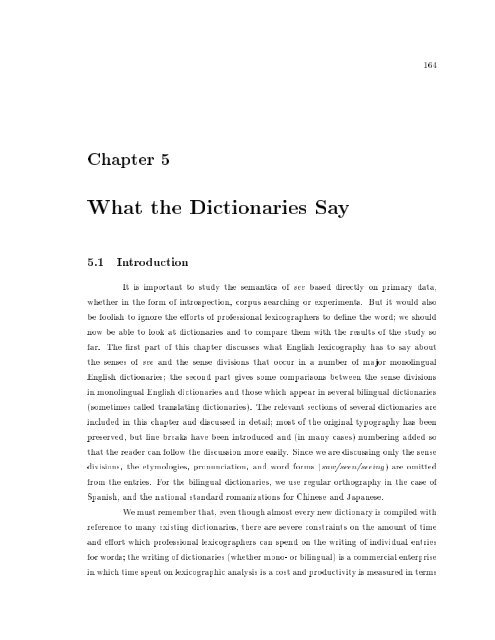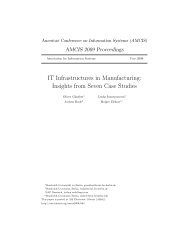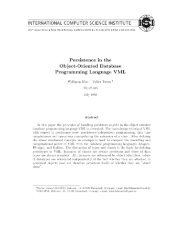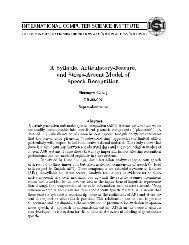- Page 1 and 2:
Seeing clearly: Frame Semantic, Psy
- Page 3 and 4:
Seeing clearly: Frame Semantic, Psy
- Page 5 and 6:
Next three psycholinguistic experim
- Page 7 and 8:
BasicSenses........................
- Page 9 and 10:
Acknowledgements Careful citations
- Page 11 and 12:
acquisition. Aside from needing to
- Page 13 and 14:
Chapter 1 Introduction Xue er bu s,
- Page 15 and 16:
CHAPTER 1. INTRODUCTION 3 In lingui
- Page 17 and 18:
CHAPTER 1. INTRODUCTION 5 Although
- Page 19 and 20:
CHAPTER 1. INTRODUCTION 7 part on t
- Page 21 and 22:
CHAPTER 1. INTRODUCTION 9 is not cl
- Page 23 and 24:
CHAPTER 1. INTRODUCTION 11 1980:10-
- Page 25 and 26:
CHAPTER 1. INTRODUCTION 13 L.U. Lex
- Page 27 and 28:
CHAPTER 1. INTRODUCTION 15 spondenc
- Page 29 and 30:
CHAPTER 1. INTRODUCTION 17 happy an
- Page 31 and 32:
CHAPTER 1. INTRODUCTION 19 shows th
- Page 33 and 34:
CHAPTER 1. INTRODUCTION 21 Regular
- Page 35 and 36:
CHAPTER 1. INTRODUCTION 23 base for
- Page 37 and 38:
CHAPTER 1. INTRODUCTION 25 d. The i
- Page 39 and 40:
CHAPTER 1. INTRODUCTION 27 (12) a.
- Page 41 and 42:
CHAPTER 1. INTRODUCTION 29 linguist
- Page 43 and 44:
CHAPTER 1. INTRODUCTION 31 Introspe
- Page 45 and 46:
CHAPTER 1. INTRODUCTION 33 on the o
- Page 47 and 48:
CHAPTER 1. INTRODUCTION 35 they con
- Page 49 and 50:
CHAPTER 1. INTRODUCTION 37 meaning
- Page 51 and 52:
Chapter 2 A Frame Semantic Analysis
- Page 53 and 54:
CHAPTER 2. A FRAME SEMANTIC ANALYSI
- Page 55 and 56:
CHAPTER 2. A FRAME SEMANTIC ANALYSI
- Page 57 and 58:
CHAPTER 2. A FRAME SEMANTIC ANALYSI
- Page 59 and 60:
CHAPTER 2. A FRAME SEMANTIC ANALYSI
- Page 61 and 62:
CHAPTER 2. A FRAME SEMANTIC ANALYSI
- Page 63 and 64:
CHAPTER 2. A FRAME SEMANTIC ANALYSI
- Page 65 and 66:
CHAPTER 2. A FRAME SEMANTIC ANALYSI
- Page 67 and 68:
CHAPTER 2. A FRAME SEMANTIC ANALYSI
- Page 69 and 70:
CHAPTER 2. A FRAME SEMANTIC ANALYSI
- Page 71 and 72:
CHAPTER 2. A FRAME SEMANTIC ANALYSI
- Page 73 and 74:
CHAPTER 2. A FRAME SEMANTIC ANALYSI
- Page 75 and 76:
CHAPTER 2. A FRAME SEMANTIC ANALYSI
- Page 77 and 78:
CHAPTER 2. A FRAME SEMANTIC ANALYSI
- Page 79 and 80:
CHAPTER 2. A FRAME SEMANTIC ANALYSI
- Page 81 and 82:
CHAPTER 2. A FRAME SEMANTIC ANALYSI
- Page 83 and 84:
CHAPTER 2. A FRAME SEMANTIC ANALYSI
- Page 85 and 86:
CHAPTER 2. A FRAME SEMANTIC ANALYSI
- Page 87 and 88:
CHAPTER 2. A FRAME SEMANTIC ANALYSI
- Page 89 and 90:
CHAPTER 2. A FRAME SEMANTIC ANALYSI
- Page 91 and 92:
CHAPTER 2. A FRAME SEMANTIC ANALYSI
- Page 93 and 94:
CHAPTER 2. A FRAME SEMANTIC ANALYSI
- Page 95 and 96:
CHAPTER 2. A FRAME SEMANTIC ANALYSI
- Page 97 and 98:
CHAPTER 2. A FRAME SEMANTIC ANALYSI
- Page 99 and 100:
CHAPTER 2. A FRAME SEMANTIC ANALYSI
- Page 101 and 102:
CHAPTER 2. A FRAME SEMANTIC ANALYSI
- Page 103 and 104:
CHAPTER 2. A FRAME SEMANTIC ANALYSI
- Page 105 and 106:
CHAPTER 2. A FRAME SEMANTIC ANALYSI
- Page 107 and 108:
CHAPTER 2. A FRAME SEMANTIC ANALYSI
- Page 109 and 110:
CHAPTER 2. A FRAME SEMANTIC ANALYSI
- Page 111 and 112:
CHAPTER 2. A FRAME SEMANTIC ANALYSI
- Page 113 and 114:
CHAPTER 2. A FRAME SEMANTIC ANALYSI
- Page 115 and 116:
CHAPTER 2. A FRAME SEMANTIC ANALYSI
- Page 117 and 118:
CHAPTER 2. A FRAME SEMANTIC ANALYSI
- Page 119 and 120:
CHAPTER 2. A FRAME SEMANTIC ANALYSI
- Page 121 and 122:
CHAPTER 2. A FRAME SEMANTIC ANALYSI
- Page 123 and 124:
Chapter 3 Other Cognitive Approache
- Page 125 and 126: CHAPTER 3. OTHER COGNITIVE APPROACH
- Page 127 and 128: CHAPTER 3. OTHER COGNITIVE APPROACH
- Page 129 and 130: CHAPTER 3. OTHER COGNITIVE APPROACH
- Page 131 and 132: CHAPTER 3. OTHER COGNITIVE APPROACH
- Page 133 and 134: CHAPTER 3. OTHER COGNITIVE APPROACH
- Page 135 and 136: CHAPTER 3. OTHER COGNITIVE APPROACH
- Page 137 and 138: CHAPTER 3. OTHER COGNITIVE APPROACH
- Page 139 and 140: Semantics of Seer entity setting ph
- Page 141 and 142: CHAPTER 3. OTHER COGNITIVE APPROACH
- Page 143 and 144: CHAPTER 3. OTHER COGNITIVE APPROACH
- Page 145 and 146: CHAPTER 4. PSYCHOLINGUISTIC EXPERIM
- Page 147 and 148: CHAPTER 4. PSYCHOLINGUISTIC EXPERIM
- Page 149 and 150: CHAPTER 4. PSYCHOLINGUISTIC EXPERIM
- Page 151 and 152: CHAPTER 4. PSYCHOLINGUISTIC EXPERIM
- Page 153 and 154: CHAPTER 4. PSYCHOLINGUISTIC EXPERIM
- Page 155 and 156: CHAPTER 4. PSYCHOLINGUISTIC EXPERIM
- Page 157 and 158: CHAPTER 4. PSYCHOLINGUISTIC EXPERIM
- Page 159 and 160: CHAPTER 4. PSYCHOLINGUISTIC EXPERIM
- Page 161 and 162: CHAPTER 4. PSYCHOLINGUISTIC EXPERIM
- Page 163 and 164: CHAPTER 4. PSYCHOLINGUISTIC EXPERIM
- Page 165 and 166: CHAPTER 4. PSYCHOLINGUISTIC EXPERIM
- Page 167 and 168: CHAPTER 4. PSYCHOLINGUISTIC EXPERIM
- Page 169 and 170: CHAPTER 4. PSYCHOLINGUISTIC EXPERIM
- Page 171 and 172: CHAPTER 4. PSYCHOLINGUISTIC EXPERIM
- Page 173 and 174: CHAPTER 4. PSYCHOLINGUISTIC EXPERIM
- Page 175: CHAPTER 4. PSYCHOLINGUISTIC EXPERIM
- Page 179 and 180: CHAPTER 5. WHAT THE DICTIONARIES SA
- Page 181 and 182: CHAPTER 5. WHAT THE DICTIONARIES SA
- Page 183 and 184: CHAPTER 5. WHAT THE DICTIONARIES SA
- Page 185 and 186: CHAPTER 5. WHAT THE DICTIONARIES SA
- Page 187 and 188: CHAPTER 5. WHAT THE DICTIONARIES SA
- Page 189 and 190: CHAPTER 5. WHAT THE DICTIONARIES SA
- Page 191 and 192: CHAPTER 5. WHAT THE DICTIONARIES SA
- Page 193 and 194: CHAPTER 5. WHAT THE DICTIONARIES SA
- Page 195 and 196: CHAPTER 5. WHAT THE DICTIONARIES SA
- Page 197 and 198: CHAPTER 5. WHAT THE DICTIONARIES SA
- Page 199 and 200: CHAPTER 5. WHAT THE DICTIONARIES SA
- Page 201 and 202: CHAPTER 5. WHAT THE DICTIONARIES SA
- Page 203 and 204: CHAPTER 5. WHAT THE DICTIONARIES SA
- Page 205 and 206: CHAPTER 5. WHAT THE DICTIONARIES SA
- Page 207 and 208: CHAPTER 5. WHAT THE DICTIONARIES SA
- Page 209 and 210: CHAPTER 5. WHAT THE DICTIONARIES SA
- Page 211 and 212: CHAPTER 5. WHAT THE DICTIONARIES SA
- Page 213 and 214: CHAPTER 5. WHAT THE DICTIONARIES SA
- Page 215 and 216: CHAPTER 5. WHAT THE DICTIONARIES SA
- Page 217 and 218: CHAPTER 5. WHAT THE DICTIONARIES SA
- Page 219 and 220: CHAPTER 5. WHAT THE DICTIONARIES SA
- Page 221 and 222: CHAPTER 5. WHAT THE DICTIONARIES SA
- Page 223 and 224: CHAPTER 5. WHAT THE DICTIONARIES SA
- Page 225 and 226: CHAPTER 5. WHAT THE DICTIONARIES SA
- Page 227 and 228:
CHAPTER 5. WHAT THE DICTIONARIES SA
- Page 229 and 230:
CHAPTER 5. WHAT THE DICTIONARIES SA
- Page 231 and 232:
CHAPTER 5. WHAT THE DICTIONARIES SA
- Page 233 and 234:
CHAPTER 5. WHAT THE DICTIONARIES SA
- Page 235 and 236:
CHAPTER 5. WHAT THE DICTIONARIES SA
- Page 237 and 238:
CHAPTER 5. WHAT THE DICTIONARIES SA
- Page 239 and 240:
CHAPTER 5. WHAT THE DICTIONARIES SA
- Page 241 and 242:
CHAPTER 6. FUTURE RESEARCH DIRECTIO
- Page 243 and 244:
CHAPTER 6. FUTURE RESEARCH DIRECTIO
- Page 245 and 246:
CHAPTER 6. FUTURE RESEARCH DIRECTIO
- Page 247 and 248:
CHAPTER 6. FUTURE RESEARCH DIRECTIO
- Page 249 and 250:
CHAPTER 6. FUTURE RESEARCH DIRECTIO
- Page 251 and 252:
BIBLIOGRAPHY 239 Bierwisch, Manfred
- Page 253 and 254:
BIBLIOGRAPHY 241 ||, & B.T.S. Atkin
- Page 255 and 256:
BIBLIOGRAPHY 243 ||. 1990. The inva
- Page 257 and 258:
BIBLIOGRAPHY 245 Osgood, C.E. 1970.
- Page 259 and 260:
BIBLIOGRAPHY 247 Wasow, Thomas. 198
- Page 261 and 262:
Appendix A Additional Corpus Exampl
- Page 263 and 264:
APPENDIX A. ADDITIONAL CORPUS EXAMP
- Page 265 and 266:
APPENDIX A. ADDITIONAL CORPUS EXAMP
- Page 267 and 268:
APPENDIX B. SUMMARY OF MORPHOLOGY A
- Page 269 and 270:
APPENDIX C. EXPERIMENT 1 257 Recogn
- Page 271 and 272:
APPENDIX C. EXPERIMENT 1 259 to lea
- Page 273 and 274:
APPENDIX C. EXPERIMENT 1 261 At the
- Page 275 and 276:
Appendix D Stimuli for Experiments
- Page 277 and 278:
APPENDIX D. STIMULI FOR EXPERIMENTS
- Page 279 and 280:
APPENDIX D. STIMULI FOR EXPERIMENTS
- Page 281 and 282:
APPENDIX D. STIMULI FOR EXPERIMENTS
- Page 283 and 284:
APPENDIX D. STIMULI FOR EXPERIMENTS
- Page 285 and 286:
APPENDIX D. STIMULI FOR EXPERIMENTS
- Page 287 and 288:
Index activation, 13, 136, 137, 231
- Page 289 and 290:
INDEX 277 description, 82 see proce
- Page 291:
INDEX 279 173{178, 186, 190{192, 20





